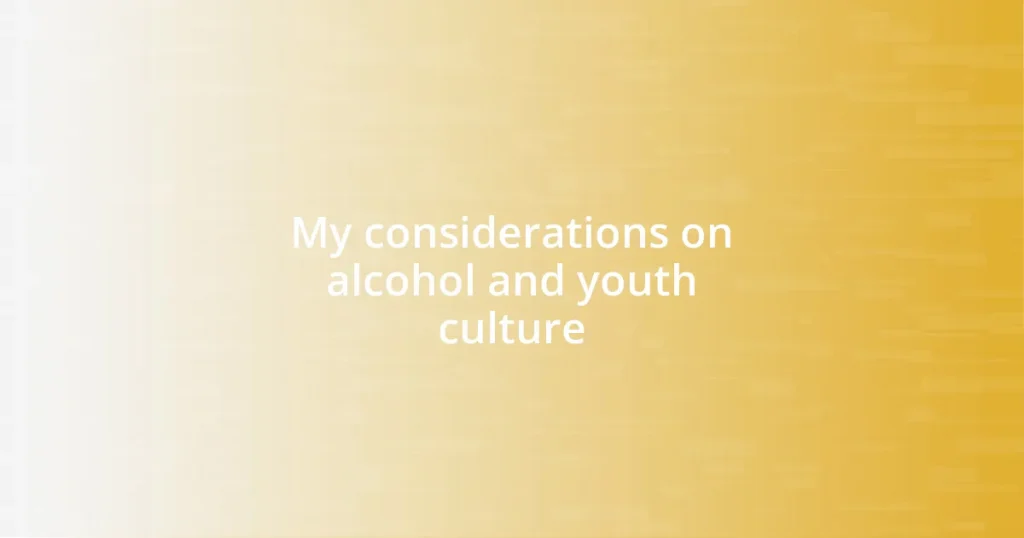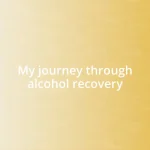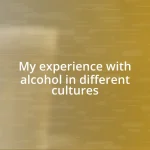Key takeaways:
- Alcohol is often perceived by youth as a symbol of independence, leading to pressures that complicate self-perception and relationships.
- Key effects of alcohol on youth include cognitive impairment, emotional instability, risky behavior, skewed social dynamics, and long-term health issues.
- Social media glamorizes drinking, influencing young people to view it as essential for social acceptance and fun, yet may mask underlying struggles.
- Promoting responsible drinking involves setting boundaries, normalizing abstention, and fostering conversations about the real impacts of alcohol.
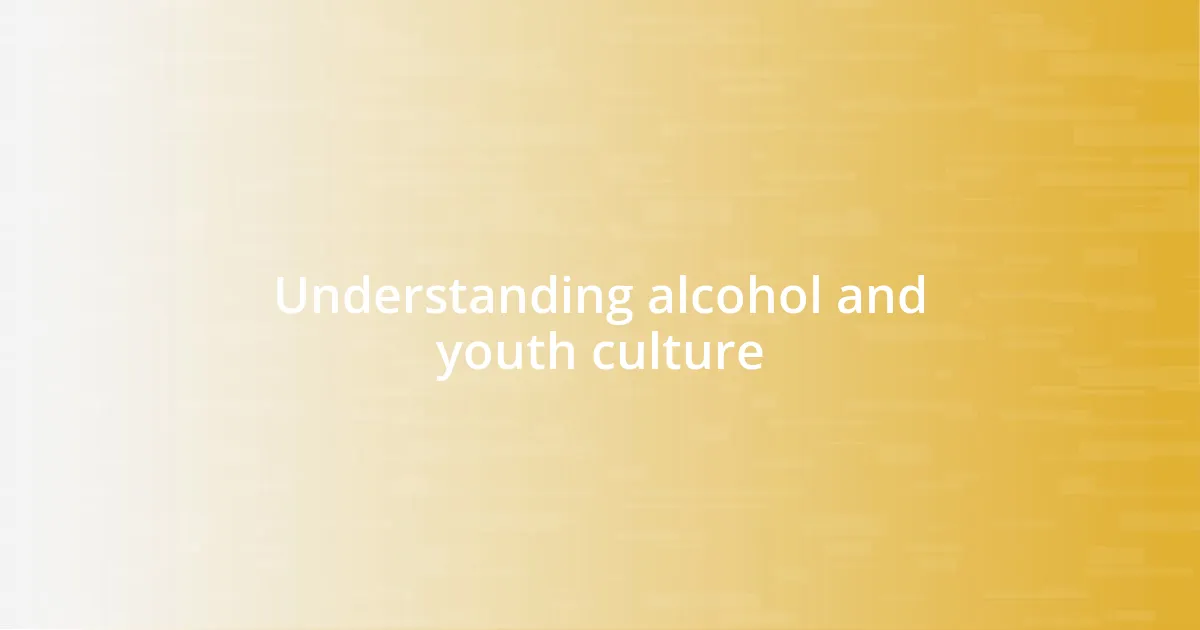
Understanding alcohol and youth culture
Alcohol and youth culture often intertwine in complex ways. I remember attending parties in my teens, where it felt like drinking was almost a rite of passage. At that time, it was easy to feel left out if you weren’t joining in, raising the question: do we truly understand the pressures that lead young people to drink?
Many youths see alcohol as a symbol of independence and adulthood, but the underlying implications can be significant. From my experience, the allure comes with not just fun, but also the weight of expectations. I often asked myself, “Is this really what growing up looks like?” This dual nature can genuinely complicate relationships and self-perception among peers.
As conversations around alcohol evolve, so do the realizations about its impact. I’ve found that when we talk openly about these experiences, it fosters a deeper understanding of what alcohol means in youth culture. Are we cultivating a responsible attitude, or simply perpetuating routines that might not be healthy? This distinction is crucial as we navigate our own journeys and those of the younger generations.
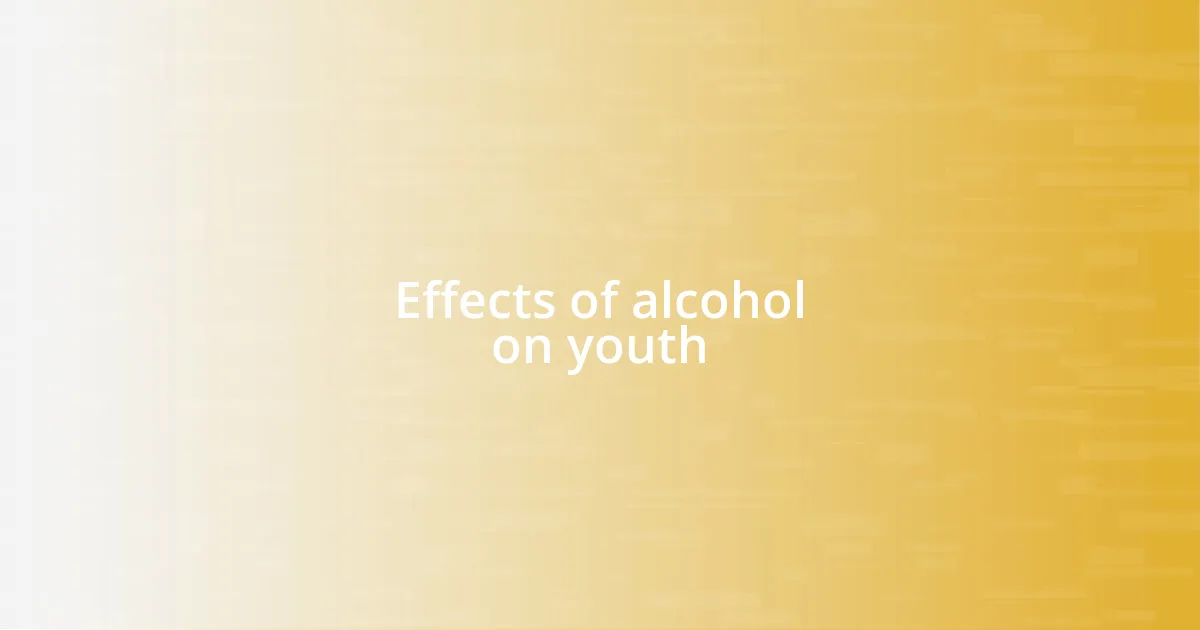
Effects of alcohol on youth
The effects of alcohol on youth can be both profound and far-reaching. I recall a close friend from my high school days who embraced drinking as a way to fit in. Unfortunately, it took a toll on her academics and self-esteem. What I’ve seen is that alcohol doesn’t just impact physical health; it can cloud judgment and lead to risky behaviors that may have lasting consequences.
Here are some key effects that have surfaced in discussions and studies around youth and alcohol:
- Cognitive Impairment: Alcohol can interfere with brain development, affecting memory and learning abilities.
- Emotional Instability: Many young drinkers experience heightened anxiety and depression, which can be exacerbated when alcohol becomes a coping mechanism.
- Risky Behavior: Increased likelihood of engaging in unsafe activities, like drunk driving or unprotected sex.
- Social Dynamics: Heavy drinking can skew social interactions, making it challenging to form genuine relationships.
- Long-Term Health Issues: Early alcohol consumption can lead to addiction and chronic health problems later in life.
Reflecting on these points, I often find myself contemplating how we can better support young people in understanding these risks. I believe conversations rooted in empathy and honesty can help create a culture that prioritizes well-being over the fleeting thrill of fitting in.
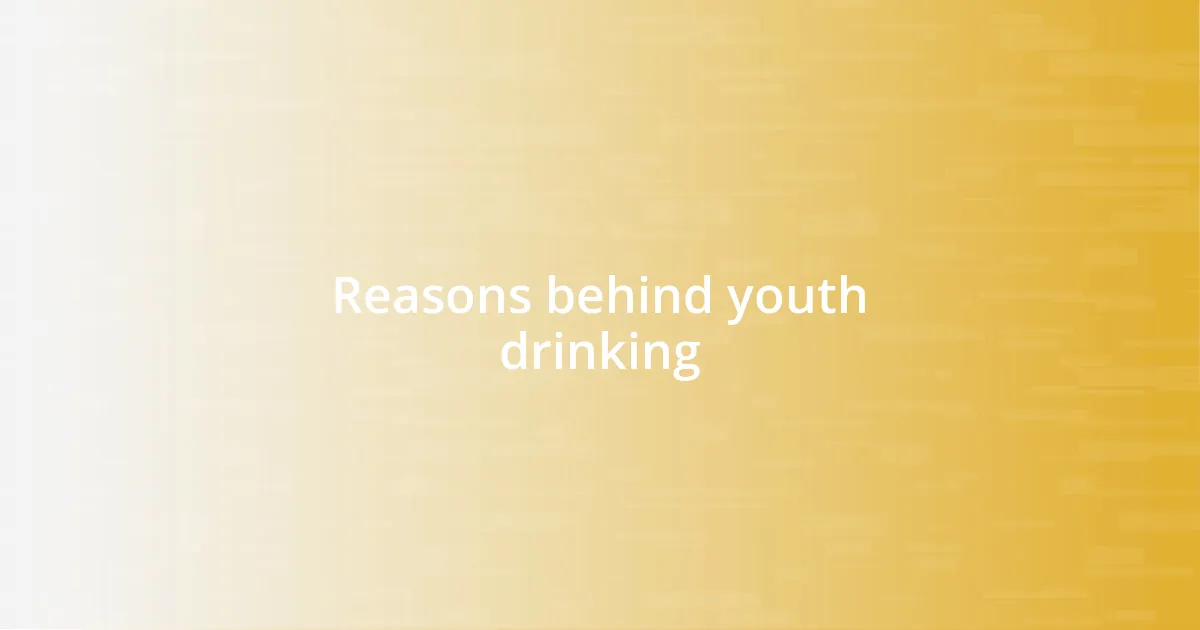
Reasons behind youth drinking
Young people often turn to alcohol due to various social influences and the desire for acceptance. I remember attending high school gatherings where the pressure to drink felt almost palpable. It’s fascinating to see how much of this drinking behavior can be traced back to the need to bond with peers or to seem more mature. This drive for social connection sometimes overshadows the harmful effects alcohol may be causing.
Cultural narratives surrounding alcohol also play a significant role in youth drinking habits. I often found myself influenced by movies and music that glorified wild parties and carefree drinking. This portrayal can create a skewed perception, making it seem like consuming alcohol is a crucial aspect of having fun. The weight of these narratives can be heavy, leading many to believe that not drinking translates to missing out on life’s joys.
Moreover, many young people consider alcohol as a means to escape their daily stresses. Reflecting on my younger years, I recall nights where friends used alcohol to numb feelings of anxiety before exams or social events. This temporary relief can quickly turn into a habit, leaving a mark on mental health and overall well-being. It’s essential to recognize these patterns to help foster healthier coping mechanisms among the youth.
| Reason for Drinking | Description |
|---|---|
| Social Acceptance | Drinking to bond with peers and feel included in social activities. |
| Cultural Influence | Media and societal narratives that glamorize drinking as part of youth culture. |
| Escape from Stress | Using alcohol as a temporary relief from anxiety or pressure. |
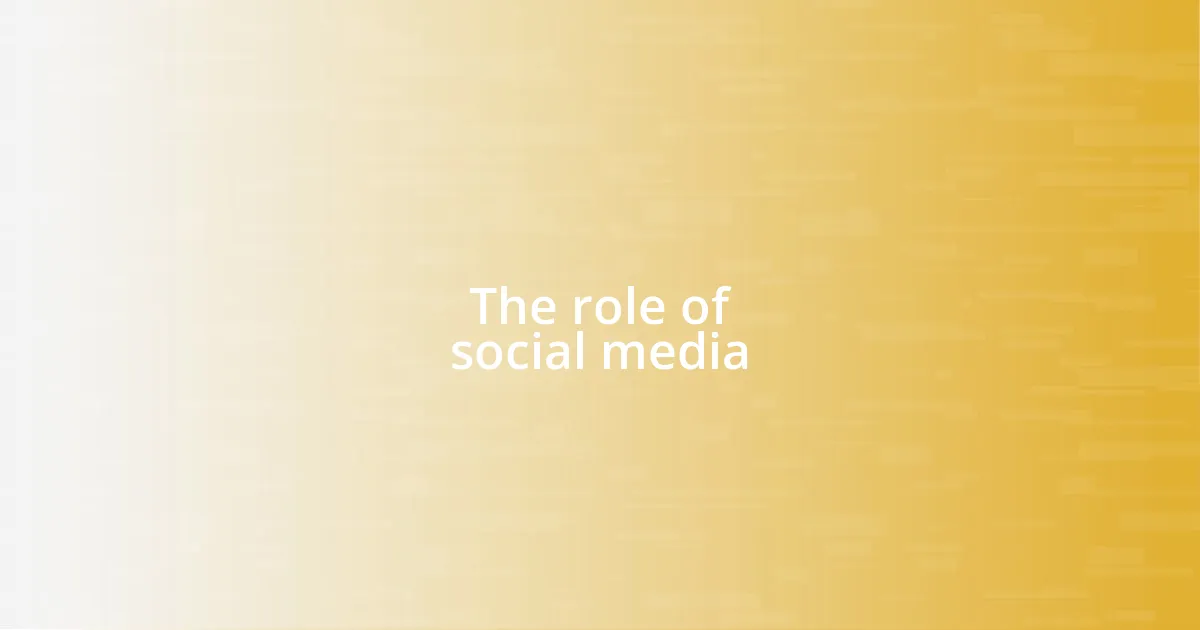
The role of social media
It’s impossible to ignore the impact social media has on how young people view alcohol. I often find myself scrolling through platforms where influencers flaunt their party lifestyles, drink in hand, and it raises a question: what message are we sending? For many youths, these images can shape their perceptions, painting drinking as an essential part of having a vibrant social life.
In my experience, I noticed how sharing a drink on social media can quickly become a badge of honor among peers. I remember a friend posting about their latest party adventure, where the number of likes and comments seemed to validate their choices. It’s fascinating, yet troubling, to see how this virtual applause can encourage risky behaviors, making it seem like everyone is drinking—though many are likely struggling silently with their own decisions behind the scenes.
Furthermore, the instant gratification that comes from online validation can lead to a cycle of seeking social acceptance through drinking. I’ve been there, feeling the pull to join in on the fun captured in these posts. It’s a reminder of how the digital portrayal of alcohol can create an environment where moderation feels like a lost cause. How do we help reshape this narrative and empower our youth to make healthier choices in a world that glorifies the opposite?
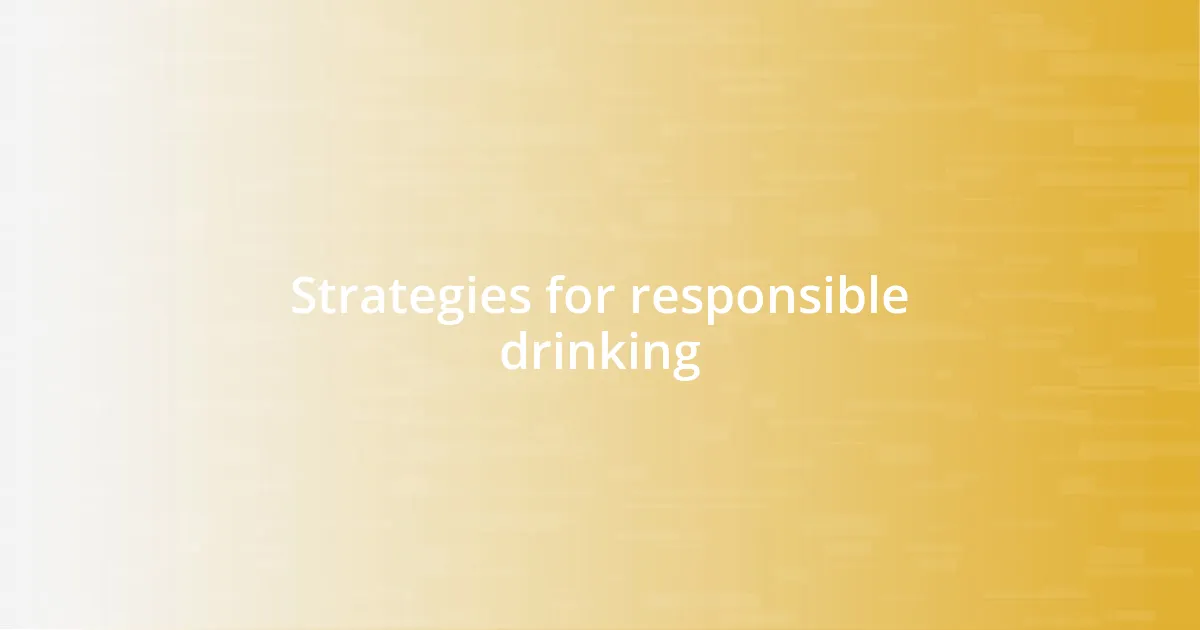
Strategies for responsible drinking
Ensuring responsible drinking among youth involves setting clear boundaries and knowing one’s limits. I recall one summer gathering where a friend introduced the “one drink per hour” rule. It was an eye-opener! Not only did it encourage everyone to pace themselves, but it also sparked conversations that kept the atmosphere light without the pressure of constant drinking. I often wonder how simple strategies like this could reshape our collective experience around alcohol.
Another powerful approach is fostering an environment where saying “no” is normalized. During college, I found that choosing to abstain from drinking was often met with confusion. However, I started to share my reasons openly, and gradually, others began to express their own hesitations. I believe encouraging this kind of honesty creates a supportive space where young people feel empowered to make choices that prioritize their well-being over social expectations.
Lastly, education around alcohol’s effects is vital. I remember attending a workshop focusing on the science behind alcohol and its impact on the brain, especially during my formative years. It was enlightening! Understanding that our brains are still developing made me reconsider how seriously I should treat drinking. Isn’t it amazing how knowledge can be a game-changer, equipping youth with the resources to drink responsibly and thoughtfully?

Encouraging healthier choices
Making healthier choices starts with conversations about alcohol and its real impact. I remember one event where friends decided to swap out traditional party drinks for fun mocktails. The surprise? The energy was just as electric, and we were all having a blast while staying sober. It really drove home a thought: celebrations don’t have to revolve around alcohol to be memorable.
I often reflect on the importance of role models in this journey. I had a mentor in college who shared their own experiences with drinking and how they chose moderation over excess. This openness was refreshing; it showed me that making responsible choices was not only possible but also admirable. Shouldn’t we encourage more figures in our lives to share their paths to healthier choices? I believe doing so could inspire younger generations to embrace a more balanced view of alcohol.
Creating spaces that celebrate activities beyond drinking is another effective strategy. I once joined a group that organized game nights instead of pub crawls. The laughter and connections made during those nights were authentic and deep, and it struck me how powerful it can be to cultivate environments where fun doesn’t have to be intertwined with alcohol. Isn’t it time we rethink the narrative around socializing and find joy in alternatives that support our well-being?










